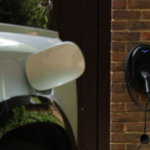
Seven EV myths about electric cars demystified
20 September 2024
What’s a smart EV charger?
23 September 2024Six major benefits of electric cars
In January 2024, Britain sold its one-millionth battery electric vehicle (BEV).
With a further 600,000 plug-in hybrids (PHEVs) also travelling UK roads, owners of internal combustion engine (ICE) vehicles may be wondering if it’s time to switch to an electric car.
The British government plans to stop the sale of new diesel and petrol-powered cars by 2035, which means all motorists will need to move over to EVs by then, anyway.
However, because there are several significant advantages to driving an electric car, making the switch sooner rather than later can bring you immediate benefits.
But what are those benefits?
Most people have heard of EVs. But not everyone knows why electric cars are set to make the future of driving in Britain (and the world) so much better.
If you’re planning on purchasing a new EV or simple EV-curious, read on as we go through six of the main benefits you’ll enjoy by having an electric car.
Benefit #1: Electric Cars Cost Less to Fuel
One of the biggest benefits of driving an EV is that it’s generally cheaper to fuel than an ICE vehicle.
Motorists who mostly charge at home can also take advantage of off-peak charging times (approx 12 am-7 am) and save big on fuelling costs.
Even if charging during the day, many electricity suppliers offer special EV energy tariffs, which continue to keep costs low for EV owners.
As of March 2024, the average cost of unleaded petrol averages at 140.3p.
Electricity is currently on a price-capped tariff of 28p per kilowatt hour (kWh)—though that’s set to drop even further to an average of 24.5p per kWh with a standing charge of 60.1p a day from 1st April 2024.
Using these measurements, we’ve calculated the cost of driving 100 miles a week in a popular EV and a comparable petrol car.
Figures calculated using the Zapmap Journey Cost Calculator
Add up those costs over a year, and it’s clear to see you’ll be putting more pounds than pennies back into your wallet with an electric car.
Benefit #2: EVs Cost Less to Maintain
Alongside cheaper fuel, the truth is that EVs also cost less to maintain than non-electric cars.
The main reason for this is that there are many more moving parts in an ICE car than in a battery electric vehicle (BEV). These all need servicing, not to mention repairing or replacing, much more often.
According to some reports, this translates to maintenance bills for EVs being almost half (43 per cent less) of those of regular diesel and petrol-guzzling cars.
Additionally, EV batteries are pretty durable and, if treated right, can outlive the car they’re in.
In most cases, an EV battery lifespan is between 100,000 and 200,000 miles.
If you incur any issues before that, it’ll likely be covered by the manufacturer’s warranty. For instance, original equipment manufacturers (OEMs) typically offer a 10-year warranty (or 100,000 miles) on all their EV batteries.
Benefit #3: Electric Cars are Easy to Charge
For non-EV owners, there may be a bit of head-scratching about how to charge their EVs.
But actually, it’s as simple as charging your phone or laptop. You plug it in, power it up, and you’re ready to ride. Easy-peasy.
Furthermore, one of the greatest benefits of an EV is that you can do all of this from the comfort of your own home.
Using a dedicated EV home charger to fuel your electric car while you sleep is safe, speedy and super convenient—not to mention much cheaper than using a public charge point.
If you’ve yet to install an electric car charger at home you can use the portable charger that tends to come with each EV purchase—but we don’t recommend this for long-term use.
These are used by plugging into a standard three-pin domestic socket. But this has not been designed for charging vehicles.
Not only will your EV take much longer to charge, but you’ll also increase the risk of overloading your home’s electrical circuit.
Public and Semi-Public Chargepoints
While having an EV Home charger is undoubtedly the best choice for anyone with an electric car, the public charging network provides a complementary (albeit more expensive) service for those traveling long distances or needing an emergency top-up.
Currently (March 2024), there are just over 57,000 public charging stations across the UK, though the British government intends to install 300,000 public charge points by 2030.
In addition, new research by Drax Electric Vehicles has revealed that one in three UK businesses that haven’t already installed EV chargepoints at their place of work, plan to do so within the next 12 months.
As these plans for public and semi-public charging stations move forward, the objective is to offer EV drivers the same fuelling convenience that ICE drivers currently enjoy.
Benefit #4: Electric Cars are Better for the Environment
Electric cars offer a significant environmental advantage over their diesel and petrol-powered counterparts.
One of the key reasons is that driving them produces no direct emissions; they generate power through their batteries, so don’t need exhausts to discharge gases.
On the other hand, traditional ICE vehicles do have exhausts, which release harmful pollutants like carbon dioxide (CO2) and nitrogen oxides (NOx) into the air.
Therefore, the more EVs on the road, the better the air quality, particularly in urban areas where vehicle emissions have led to high health concerns.
The environmental benefits of EVs extend beyond the road too.
Electric cars have the potential to be more energy-efficient than conventional vehicles, especially as the electricity grid becomes cleaner with the incorporation of renewable energy sources.
Along with transitioning to electric cars, the UK is committed to decarbonising the national electricity system, aiming to get 95 per cent of the country’s electricity from low-carbon sources by 2030.
Scaling back our dependence on finite fossil fuels and powering our cars with renewable energy will pave the road towards a more sustainable and environmentally friendly future.
Benefit #5: Electric Cars Reduce Noise Pollution
If you lived in a large city or town during the recent pandemic lockdowns, one of the strangest differences (among the many) was the silence on the streets (I mean, birdsong! Who knew?!) The reason? Far fewer engine-revving cars on the roads.
According to a study carried out by the European Environment Agency, road traffic is the single biggest contributor to noise pollution and the second most harmful environmental stressor in Europe, behind air pollution.
In England alone, it’s estimated that the annual social cost of urban road noise is around £7–£10 billion.
One of the major benefits of cars powered wholly by electricity is that without a combustion process, the sound produced is minimal.
Of course, most EVs emit some sound as a safety precaution to alert pedestrians and other drivers of their presence—But the ear-splitting roar of hundreds of competing engines on the road? Yep, that’ll become a thing of the past as more motorists switch to EVs.
Not only will this transform our everyday experiences of moving through urban centres, but as long-term exposure to loud noise is proven to be a cause of high blood pressure, heart disease, stress and sleep disturbance, the health benefits of having more electric cars on our roads are hugely significant.
Benefit #6: Electric Cars Out-Perform ICE Cars
When electric cars first began arriving to market en mass over 20 years ago, they were deemed slower and less powerful than their petrol and diesel-guzzling equivalents.
Through ongoing technological advancement, that idea has been put to bed and the truth is that most EVs now outperform comparable ICE cars.
For starters, electric cars tend to accelerate faster than traditional diesel and petrol-pumped cars. This is down to the fact that EVs can reach full torque (the force that drives a vehicle forward) immediately from a standstill.
In contrast, traditional ICE cars take longer to get power to their wheels as that power has to move through various other parts first.
The speed of an electric car depends on the car model, but most are fast enough for everyday use. If you do have a particular need for speed, however, the “fastest-accelerating road-legal car in the world” according to Car Magazine is the Aspark Owl, which can go from 0–60mph in a stomach-flipping 1.69 seconds!
The handling of EVs is likewise excellent.
Most electric cars have the battery pack positioned below the underbody in the centre of the car, which helps provide stability and weight distribution, and so reducing the chance of a rollover.
However, it should be noted that an EV’s immediate torque coupled with a body that’s generally heavier than a car with a regular combustible engine may mean you’ll be replacing your tyres a little more frequently.
If you’d like to find out more about the various benefits of having an electric car, we provide a range of resources to help you navigate through the ever-developing and exciting world of EVs.
Additionally, if you’re interested in installing a solar-powered EV home charger, we’re happy to chat so call or drop us an email.
About Powerverse
We’re industry experts in home energy management. Our easy-to-use app is built for your future electric home. It will effortlessly sync your solar, battery, heat pump, EV charger and more, helping you cut costs and your carbon footprint on your way to becoming energy-independent. Curious to know more? Talk to one of our experts.

